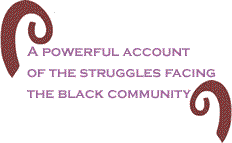|
Jamala
Rogers, the veteran activist, organizer, writer and BlackCommentator.com
Editorial Board member, has written a new book about the
African-American experience.  And
if you care about black folks, human rights and social justice,
perhaps you should take a look. And
if you care about black folks, human rights and social justice,
perhaps you should take a look.
The
book, The Best of “The Way
I See It” and Other Political Writings (1989-2010),
is a collection of the author’s commentaries from the
Saint Louis American, BlackCommentator.com
and other publications. Spanning over several decades to
speak to the struggles of the black experience and examine
the wrongs waged against the community. Rogers’ work is actually three books in one – part-storybook of the
poor and oppressed, part-annotated history of black people
in America,
part-recipe book for addressing inequality and injustice.
The
power of Jamala Rogers’ writing is its accessibility, and
its clarity in articulating the challenges of everyday people.
Her words make readers feel as if they are a part of the
story, and motivate them to take action. Commentaries that
she wrote in the 80s and 90s, having stood the test of time,
are as relevant, timely and fresh as if she just wrote them
yesterday.
“My
intent is always to have a conversation with my readers
– to inform, to inspire, and to move them to action. That’s
whether it’s the waitress at the local restaurant or the
professor at the university,” Rogers
writes. “My writings are inspired and informed by the valiant
struggles of peoples to their oppressive and exploitative
conditions no matter where they are in the world. My goal
is to expose the systems that reproduce those conditions
and to provide possible strategies for our collective discussion
and actions. I strive to show the inter-connectedness of
the global economic system and how it affects [our] daily
lives.”
What
should strike the reader is the depth of the author’s knowledge
on a variety of subjects - whether historical or current
events - and the diversity of issues she tackles in this
book. Perhaps it speaks partly to the universal and intractable
nature of injustice. However, ultimately it tells far more
about the skill and knowledge of the author.
 The
Best of “The Way I See It” is a journey across America and the world. In
one chapter, Jamala tells the story of the Tuskegee Experiment,
when the U.S.
government played with the lives of black men by allowing
them to suffer for years and die from untreated Syphilis.
Another chapter may discuss the controversial black boxer
Jack Johnson, or the plight of the Palestinians, Haitians
or Katrina victims, or coal miners, or a police brutality
victim. The
Best of “The Way I See It” is a journey across America and the world. In
one chapter, Jamala tells the story of the Tuskegee Experiment,
when the U.S.
government played with the lives of black men by allowing
them to suffer for years and die from untreated Syphilis.
Another chapter may discuss the controversial black boxer
Jack Johnson, or the plight of the Palestinians, Haitians
or Katrina victims, or coal miners, or a police brutality
victim.
Another
subject that permeates this collection of stories is Rogers’
beloved, and many times not so beloved, city of St. Louis. St. Louis, as the author reminds us, is the location of the Old Courthouse
where the original Dred Scott took place and justice ultimately
was denied. St. Louis is also a city where black children had to run for their
lives while attempting to integrate a public swimming pool,
as an armed white mob chased and spat at them. And like
so many other cities, public hospitals that serve the poor
are shuttered to make way for condominiums, bad police officers
are acquitted, and wars are waged against popular, community-oriented
black journalists.
“In
the Lou, ours is an ongoing struggle to overcome intractable
racism to create a safe and just place that protects the
human rights of all,” Jamala Rogers writes of St. Louis in the book. “This is a city which has
held several dishonorable titles, including Most Racially
Segregated, Most Dangerous City, Least Kid-Friendly City,
#1 in Racial Mortgage Rate Disparity, just to name a few.
St. Louis racism is not just a figment of our imagination, it is our
brutal reality.”
The Best of “The Way I See It” was an enjoyable read, opening my
eyes on certain subjects and reaffirming what I already
knew concerning others. Although I first expected a compilation
of articles, what I discovered was a powerful account of
the struggles facing the black community.

BlackCommentator.com Executive Editor, David
A. Love, JD is a journalist and human rights advocate based
in Philadelphia, is a graduate of Harvard College and the University of Pennsylvania
Law School. and a contributor to The Huffington
Post, the Grio, The Progressive
Media Project, McClatchy-Tribune News Service, In These Times and Philadelphia Independent
Media Center. He also blogs at davidalove.com, NewsOne, Daily Kos, and Open Salon. Click here to contact Mr. Love.

|

